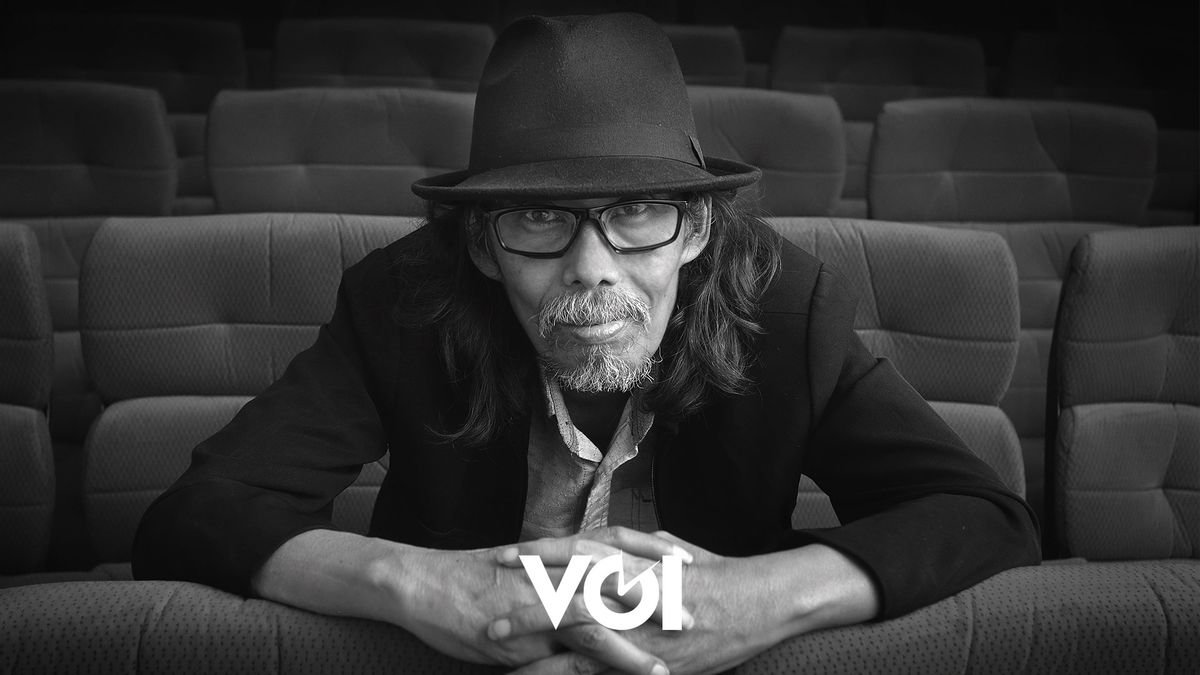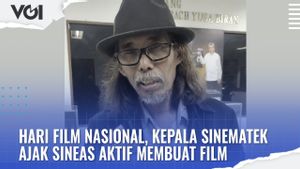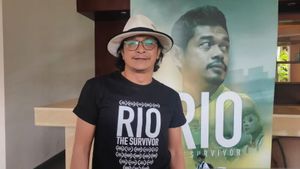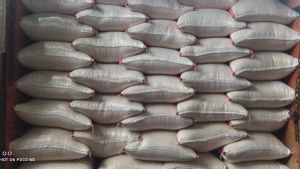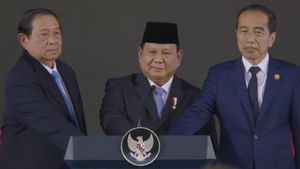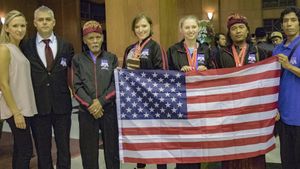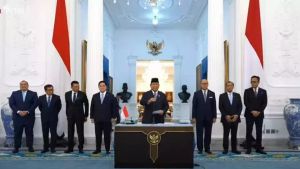Film as a work of art can actually be a bridge across generations to understand the historical context of a period. Akhlis Suryapati, Chair of Sinematek Indonesia underlined the importance of archiving films that can become material for the next generation to understand the culture and situations of the past. Through this film, said the man who is also a director and a senior journalist, we can see Indonesia and nurture memories.
***
Every March 30, Indonesian filmmakers celebrate National Film Day. This date is set based on the history of the first shooting of a film made by the late national film figure H. Usmar Ismail who acted as the director of the film titled Darah dan Doa or in the English version entitled Long March of Siliwangi.
National films have experienced ups and downs. Had experienced a heyday in the era of the 1970s to 1980s, then suspended animation, and is now rising again. The COVID-19 pandemic has again confused filmmakers, as have other affected sector business actors. It is hoped that film production will get excited again along with the sloping pandemic situation and the reopening of cinemas as a vehicle for showing films.
Through the film, said Akhlis Suryapati, we can see the historical development of the nation's journey. “Through films, we can see the development of our history. For the last three years, we have used the tag line 'see Indonesia, nurture the memories.' This means that we can see Indonesia as well as care for our memories through films. And it can be seen when many researchers and students who come to Sinematek want to see Indonesia through films made by our filmmakers,” he said.
Sinematek Indonesia, as the only institution that specializes in archiving films in Indonesia, and collecting works related to films has an important role in efforts to preserve films made by filmmakers. However, Akhlis continued, the awareness to save and maintain films in this country is decreasing day by day. In fact, he said, when a film can be collected by an institution such as Sinematek Indonesia which he leads, it can be a learning vehicle for the younger generation and anyone who has an interest in the world of film, ten years, twenty years or more, film works will be sought.
In the framework of National Film Day, Iqbal Irsyad, Edy Suherli, Savic Rabos, and Rifai conducted a special interview about filming in Indonesia to Akhlis Suryapati not long ago. Here's the full excerpt.

March 30 is celebrated as National Film Day, what did Sinematek Indonesia do?
In the last three years, every Sinematek Film Day has a tradition of holding a Sinematek Festival event. Actually, the same as other film festivals, at the Sinematek Festival, we give awards to national film figures through the Legend Award. The criteria for this legend to bequeath his profession directly to his children. Last year we gave the Legend Award to the late Bing Slamet. Because he bequeathed his profession to Adi Bing Slamet, Iyut Bing Slamet, and Ferry Bing Slamet.
There is also the Annarari Award, which is an award for institutions or individuals who care about film archiving. And lastly is the Excellence Award, this award for the best film version of Sinematek. Apart from cinematography, there are also criteria for having a high archival value. Then we also hold various discussion events, film screenings, and entertainment in the context of this year's National Film Day.
Who will the 2022 Legend Award go to?
This Legend Award has its own parameters, in this case, he bequeathed it directly to his descendants. It's not that those who don't have children can't get this gift. However, those who have descendants and continue their profession in the film world are considered to have more value. This year, we have determined that the late Usmar Ismail, Suryo Sumanto, and Sofia WD will receive the Legend Award.
Earlier you mentioned a film that has a high archival value has a chance for the Excellence Award recipient, can you explain this?
This is for the best film category, in addition to the best cinematography elements, the story is also good, it also has added value regarding archives. Because we assume someday, many years later a film is needed for research, study, and so on. What we have ever given is the film Bumi Manusia. The film, which is based on a novel by Pramoedya Anantatoer, has been worthy of being archived since the novel. Likewise when the story was filmed. Last year we gave this Excellence Award to the films Hayya, and Abracadabra.
In general, what is the current state of Indonesian film archiving?
I happen to have made a film about how the world of film archives in Indonesia is. This film very clearly tells about the archives in Indonesia which later transformed into Sinematek. In Indonesia, the spirit of film archiving was indeed pioneered by the film's character, in this case, Misbach Yusa Biran and his friends. Because they are both film people, they have an awareness that film archiving is important.
At that time, Misbah was able to socialize the archiving awareness well, so that they could then collect films, items that were made into the collection of Sinematek Indonesia. Until now, our status is as an independent private sector, managed by the film community in this case the Foundation (H. Usmar Ismail Film Center Foundation), running as Misbach Yusa Biran aspires. However, people's expectations sometimes want Sinematek Indonesia to be like a luxurious National Library and like the National Archives with many buildings. The presence of this Cinematek becomes something important. Now it is no longer the largest in Southeast Asia because in Thailand there is a similar institution funded by the state. Unlike the purely private Cinematek. But we still collect, care for, and preserve films.

What is Sinematek's main obstacle, is it funding?
The issue of funds is an obstacle because we are facing the expectations of the people who want ABCD. But if we are realistic, in the sense that we will continue with the current situation, it doesn't matter. We organize film archiving activities that we seek ourselves and donate to other parties. What is rather expensive is the maintenance of film collections.
The problem you mentioned about Thailand is now the biggest because of the government's role, for Indonesia, what is the government's role in assisting the archiving of this film?
Actually, I don't know exactly about Thailand, but right now we don't have the confidence to be said to be the biggest in Southeast Asia. Even though in reality they are not necessarily the greatest. Sinematek never received direct assistance from the government, except during the time of Ali Sadikin Simematek received endowment funds. That is what is used continuously until now. In our program, we collaborate with the Ministry of Education and Culture for film digitization, with film companies, and with individuals.
Now, how is the awareness of film producers to archive their films at Sinematek?
It used to be that the awareness to archive films was great. Now the awareness of it is waning. In the past, storing celluloid film was expensive. If you store it yourself, it can be damaged if you don't know how. That's why the film collection is stored at Sinematek. Now simply save it on a hard disc or some other form.
How to add a film collection at Sinematek?
We ask for awareness from fellow producers to keep their collections at Sinematek. Another way when judging the FFI, for example, is that there is a collection of films recorded in VCD format. After the judging, instead of throwing it away, we ask the committee to hand it over to Sinematek. When there is an activity to show Indonesian films abroad that we do, after the event the films can be stored at Sinematek. But in general, the enthusiasm for saving films is not what it used to be.
Through films, we can see the development of our history. For the last three years I have used the tagline 'see Indonesia, nurture the memories.' This means that we can see Indonesia as well as care for our memories through films. And it can be seen when many researchers and students who come here want to see Indonesia through films made by our filmmakers. When it comes to assistance from the government, they provide support and emphasize that archives are important.
VOIR éGALEMENT:
During the two years hit by the COVID-19 pandemic, how did Sinematek deal with this situation?
During this pandemic, Sinematek's office remains open. The problem is that the office is spacious while the employees are few, the matter of maintaining distance is not a problem. Employees use masks and health protocols that are always implemented. There is even a tendency for researchers and student visits to increase during this pandemic. Those who came were engrossed in Sinematek. To add to the collection, the condition is rather apprehensive. Because we don't have more ability to add to our collection in this digital film era.
What kind of film restoration is done?
We have never done the restoration ourselves, so far we have done it in collaboration with other parties in the film Lewat Djam Malam. If you don't own it, you can't because the cost is too big. Restoration of one film can cost up to IDR 1.5 billion.
Until now, how many film collections are there at Sinematek?
For celluloid films, our collection amounts to more than 2,700 film collections. Now that number is not increasing, because no one is producing films in celluloid format anymore. Most of them are in digital form, currently, there are around 5,000 film collections in digital form.
How to bring Sinematek closer to young people and millennials?
We try to package this Sinematek activity so that it can be close to young people and the millennial generation. The series of activities in the framework of National Film Day is also packaged by targeting young people, so that what is at Sinematek can be close to the millennial generation.
Now our life is surrounded by movies. In all places, houses, stations, on the street everywhere movies are shown. When we have awareness of the past, today, and tomorrow through films, we already have provisions. The archive contains past films, today's films and from films, we can predict the future because films also make futuristic things. If the film archive is understood like that, it is really needed by today's millennial generation.
Sinematek is 47 years old, is the founder's original goal still relevant today?
Incidentally, I just finished a film called Tearing Memory Of Indonesia which I picked up from the memoirs of Misbach Yusa Biran. I try to continue and realize his goals with the programs that I described earlier in accordance with the times. In that context, the ideals of establishing Sinematek have been achieved, without having to make a peg bigger than a pillar. Cinematek becomes a center for people who need information about films to reach. However, if the expectations are similar to that of the American Library of Congress, it cannot be equated. Our situation is as it is now. For me, I am grateful for this situation, the important thing is to be independent without being infiltrated by activities other than archival matters.
Regarding remote services via online, we cannot serve, for fear of violating the code of ethics and copyright. We do keep a physical collection of films, but the rights remain with the film owners.
The Correlation of Akhlis Suryapati's Wandering Habits with His Health

Whether we realize it or not, it turns out that there is a correlation between Akhlis Suryapati's habit of wandering here and there or moving, and his health. At least that's what he experienced in his daily life. It turns out that a lot of moving can be a substitute for sports even though they are not the same and comparable.
This senior journalist who is now the Head of Cinematek Indonesia admits that he does not exercise regularly, but he is diligent in moving, moves here and there on foot. Sometimes he chooses to take the stairs even though there is an elevator, when the queue to go up is too long. Or just to look for something in a shop near his residence, instead of starting the vehicle he prefers to walk.
“For sports, I am very lazy, meaning regular exercise like what many people do. However, I often move around here and there. If people like to take the elevator, I prefer to take the stairs rather than the long queues,” admits Akhlis.
It's not that he's never played sports. He did ping pong and running. But it was just for fun, he joined because of the association with friends, not his motivation to maintain or improve health.
You can believe it and you can also vice versa, with the behavior of this shoulder-length-haired man, there is a correlation with his health. Even though what he said needed further proof. “I am not diligent in exercising, but it turns out that the habit of moving and around here and there have its benefits. One of the proofs was when I was about to take part in the selection to become a leader in one of the institutions. One of the conditions must be a general check-up. And the result is my health is good,” he explained.
In terms of food, he doesn't really take care of himself, and he often overdoes it and doesn't obey the rules. Moreover, how to eat like those who apply the diet from a doctor or nutritionist. He even used to pass this life with fun. "I'm not arrogant, thank God during this COVID-19 pandemic I am still healthy and not exposed," he admitted.
Then what did he do? "There's nothing special, what I do is mediocre. I've also had a cough and flu in the past two years. Because I was afraid to go to the hospital and thought I was exposed, I finally just let it go until finally the cough and flu went away on their own,” he said.
Regarding health, for Akhlis it is not just physical. But also non-physical matters such as the mind. "If you say I take care of my health, it's normal. I take care of my mind more,” said Akhlis, who is also the director.
There are three pillars that need to be secured in carrying out this life according to Akhlis. "First of all, it's about the economy, there really needs to be an economy. Both matters of love and affection, it is obtained from the wife and family. And thirdly, I still have hope for a better future. When these three things are in balance. That's what makes our minds healthy. Remember the biggest factor that affects health is the mind,” said the director of the film Lari Dari Blora.
When asked about maintaining food intake, Akhlis has a way that is not adventurous. "It's said to take care of food, I'm not too strict, whatever I eat. Because I'm the type of person who enjoys life. I can enjoy food from food stall classes to star hotels without a hitch,” he continued.
If people avoid eating at night, it's the exact opposite. “In the afternoon I have a lot of activities, sometimes I'm late and I forget to eat. I actually eat a lot of it at night. So there's no such thing as taking care of the food. When it comes to maintaining cleanliness, there is no bargaining," he said.
When he was engrossed in eating chips or goat satay which became his favorite, someone started to quip. "Age can't be tricked, you know, not a few family and friends say that. I just eat, the important thing is that I have to know myself when I have had enough, then stop," he said.
Office Affairs

During the COVID-19 pandemic, which has lasted more than two years, the Sinematek Indonesia office, located in the Kuningan area, Setia Budi, South Jakarta, did not implement work from home (WFH) as many government and private offices have practiced.
"It's true that during this pandemic we don't take holidays or apply WFH. The problem is that the Sinematek Indonesia office is spacious, and there are not many employees. It's a relief here, one employee and another employee who wants to be made 5 meters apart can still do it. Researchers or those who want to seek information at Sinematek like to hang out for a long time, because the situation is conducive,” said the man who was born in Pati, Central Java, on January 3, 1963.
Apart from that, while in the office, he and the Sinematek employees continue to carry out health protocols. Employees wear masks, disinfectant is sprayed every weekend.
And what needs to be underlined, said Akhlis, is that his office activities are not high-intensity interactions with people. "Those who come to Sinematek are researchers or people who have a high interest in films and the intricacies of films," he explained.
During this pandemic, many researchers are happy to linger at Sinematek, the number has increased from before the pandemic. "Yeah, maybe they can concentrate more here. So they feel at home in our place looking for the information they need through films and other collections available by Sinematek,” he said.
So, said Akhlis Suryapati, the pandemic did not stop activities. Activities that occur are still as usual despite the implementation of health protocols. "Indeed, everyone is affected by the pandemic, in our place activities can still be carried out. So the pandemic has not stopped activities at Sinematek, especially after recently the situation has become more conducive," he continued.
Ethics

The development of increasingly advanced technology has made various large cameras that were used to be abandoned, even with cell phones, people are able to make films. The convenience and sophistication of this technology must be used wisely.
“Betacam cameras, which used to cost IDR 400 million, are actually still functioning well. But the price of the cassette is only IDR 250 thousand, even that is difficult to find and the duration is only 30 minutes. The process is fairly complicated. Finally, the camera was used as a display only, technology has become more sophisticated. With cell phones, people can make films," he said.
Even though it is facilitated by technology, according to Akhlis, you have to be careful in recording and making films, they must be based on ethics. "The film was made in the concept of art, technology must be utilized as much as possible for the work of art," he said.
And don't forget, Akhlis reminded, when referring to the law on making films, it must be based on noble values. Therefore ethics and knowledge are equally important. Otherwise, it will slip on making a self-harming film. For example, many people have made inappropriate films,” said Akhlis Suryapati.
“Through films, we can see the development of our history. For the last three years, I have used the tagline 'see Indonesia, nurture the memories.' This means that we can see Indonesia as well as care for our memories through films. And it can be seen when many researchers and students who come here want to see Indonesia through films made by our filmmakers.”
Akhlis Suryapati
The English, Chinese, Japanese, Arabic, and French versions are automatically generated by the AI. So there may still be inaccuracies in translating, please always see Indonesian as our main language. (system supported by DigitalSiber.id)
